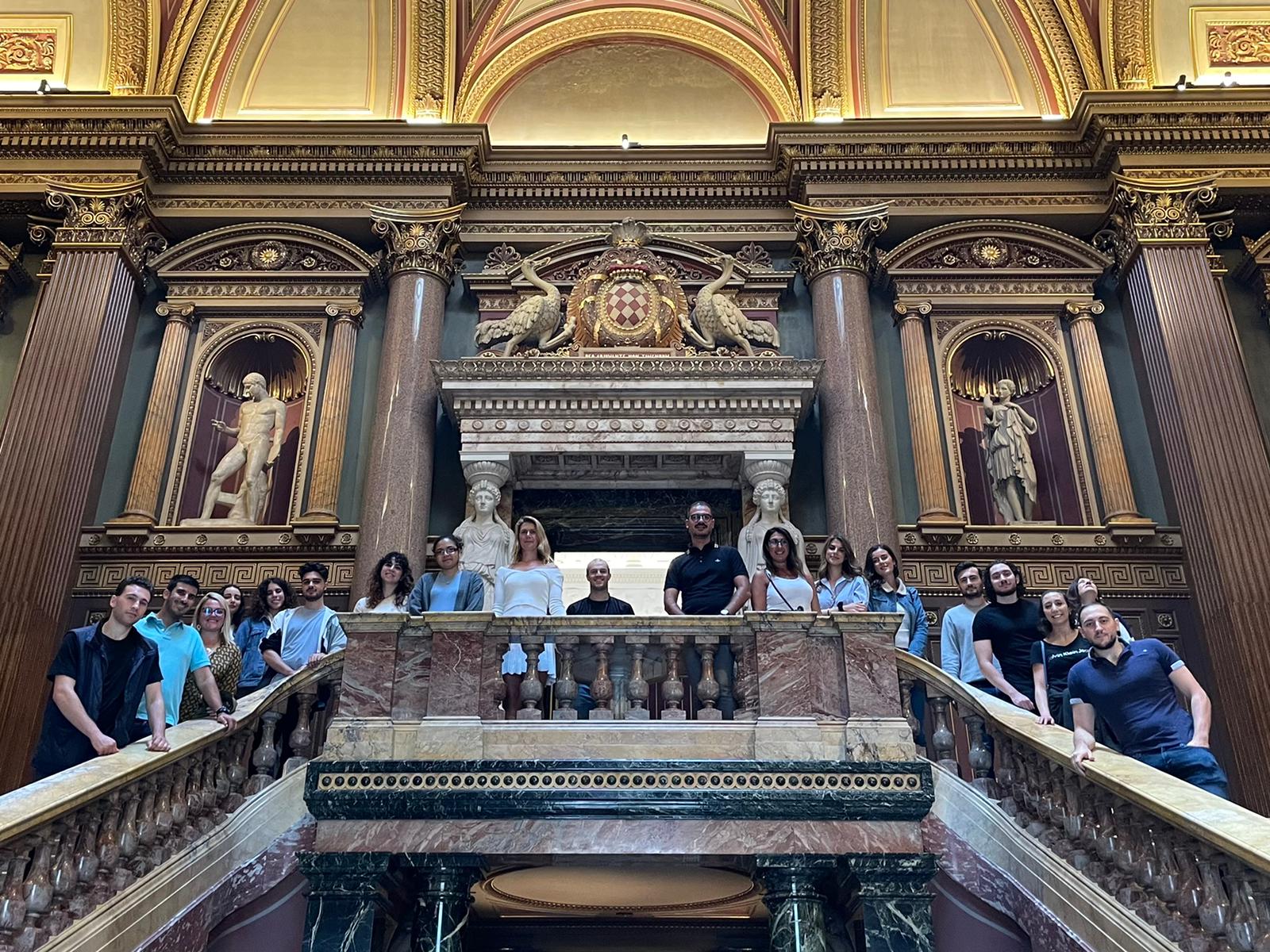

Public engagement and advocacy of the diverse groups that make the Being an Islander community, is at the heart of our practice. Our programme rethinks the major research themes that transcend the project, insularity, mobility, materiality, migration, accessibility to heritage, and decolonial practice within the discipline of Mediterranean Archaeology; and invests in practice and community co-creation, translating these into dialogue, active representation of individuals and communities, Contemporary Art projects and performances, film making and co-curated content. Engagement with the major themes of the project is not driven by its research teams, it is informed, shaped, and debated together with our numerous, island communities in Greece, Cyprus and Italy, the diverse diasporic communities of these lands in the United Kingdom and beyond, the queer community and the artists inspired by the past of these large Mediterranean islands.
Through our programme we make the collections, objects, and their histories relevant to what matters to all of us today, whether that might be their provenance and the way they were acquired, or the context of their archaeological discovery as well as their histories as they navigated through different institutions. As a community of researchers and practitioners, we strive for the project to lead to the creation of innovative, immersive, and groundbreaking projects and exhibitions, ones that also ask difficult questions and don’t rely on just the curators and researchers to answer them; ones that engage our diverse audiences to their interpretations. The project also promotes work that encourages a dialogue between ancient and contemporary material culture, queer perspectives in ancient Art and material culture, and the impact of Migration as a global phenomenon.
Since 2019, the project has implemented over 100 public engagement actions, events, Art installations, Creative Commissions, workshops, talks, performances, seminars, and community events, nationally and internationally, in addition to learning activities inside and outside the Fitzwilliam Museum. A selection of our recent actions includes:
A Day in a Neolithic village of Cyprus : Our virtual reality installation took place over a period of one month (March- April 2023 ) at the Fitzwilliam Museum, Seminar Room and allowed our audiences to experience one of the earliest settlements in ancient Mediterranean Cyprus and Europe, the Neolithic village of Khoirokitia. Users were invited to learn what drove people to live together in this pre-urban settlement, discover more about their everyday habits and touch some of the objects from the ‘Islanders’ exhibition in their original archaeological context. The installation was created in collaboration with the Virtual Environments Lab at the Cyprus Institute, part of the STARC research cluster Center Overview - The Cyprus Institute (cyi.ac.cy), headed by Prof Giorgos Artopoulos. The VR installation afforded an opportunity to explore learning outcomes prompted by this new technology. The museum’s learning /public engagement teams and CyI worked together to tailor the information and scope of the VR environments towards specific learning strands, for families, school-aged children and young people. VR installations have been promoted and praised as a driving force for engagement with wheelchair users, as the kinetic dimension that the VR environment offers a new form of interaction for those unable to stand or walk. We have ensured the experience was available to wheelchair users, and it has indeed proven very popular on that audience group as well as receiving enthusiastic engagement at the University of Cambridge and in London at the premises of the Cyprus High Commission where it is offered to the wider public, until the end of July 2023, free of charge.
Anastasia Christophilopoulou delivered an online tour for the “Museum Whispers in Panopticon”, a joint engagement project of the Research Laboratory for Museology of the Department of Archives, Library Science and Museology of the Ionian University and the Second Chance School of Corfu Prison (SDE Corfu Prison, June 14). The programme contributes to the empowerment of the school’s students and subsequently to their access to culture as a vehicle for social inclusion and integration, with online lectures taking place in Belgium, Greece, Qatar, South Africa and the United Kingdom.
Our project team continues to work on the migration engagement project, delivering family -centred sessions for recently relocated refugees and asylum seekers, in the area. We also organised 2 lectures given by Dr Tugba Basaran, Director of the Centre for the Study of Global Human Movement, Cambridge University, titled: “Where are our borders?” May 3, 2023, and “Crossing the Seas: Refugees and rescuers” May 10, 2023.
Dr Christophilopoulou also gave a lecture titled : “Being an Islander: Mediterranean Island in the Past and Present”, during the European Borders and Borderlands, International World Refugee Day: Refugee Inclusion, Tuesday 20 June 2023, Cambridge Centre for the Study of Global Human Movement.
The project continues to deliver diverse learning activities in partnership with our Learning Team: Three sessions took place for very young children and their families, titled’ It’s Magic’ in April and May 2023. Designed for 2-5 year olds, these drew on the themes of journeys and knowledge-sharing in the exhibition. A story was written specifically for the session based on an adventurous traveller moving from island to island, gathering souvenirs and memories using his five senses. The story was told using key objects in the exhibition and handling materials. Families also had the opportunity to make clay boats inspired by what they had seen.
Another set of sessions, ‘Toddler Magic’ for 1-3 year olds focused on the sensory aspects of the exhibition, with families being introduced to the objects through a Greek children’s song, samples of Cyprus perfume, rhythm games, and careful handling of replica objects in the gallery. This was complemented by a multisensory creative workshop in which families made their own perfumes from natural ingredients, tasted fresh Mediterranean produce, and played at sand-pit archaeology.
Finally, ‘Gurgling in the Gallery’ for babies under 12 months and those who care for them provided a relaxed introduction to the exhibition for adults, with gentle sensory activities focusing on the sound and rhythm of waves. Picking up on the theme of journeys and movement, the adults used the poetry in the exhibition to reflect on the journey of parenthood and created their own artworks using collage techniques while their babies explored materials and shapes through supported heuristic play.
Quote from participants in the sessions included:
‘It was very carefully structured, around sights, sounds, smells, tastes. It was clear that a lot of careful thought and organisation had gone into the session. The repeated motif of the Greek song, sung in each room, was great - a lovely way of tying things together and making connections for the children. The activities in the studio were brilliant - the ‘archaeological dig’, the perfume making. My child was so stimulated and interested by it all. The female curator leading the session (I don’t know her name I’m afraid) was wonderful, setting a tone that was educational and informative yet warm, friendly and welcoming. The way in which she and the rest of her team interacted with the children (and families) was excellent.
Our Learning associates Sarah-Cate Blake and Nathan Huxtable created an activity titled ‘Earth painting’ for the Museum’s Muse group, which ran during May2023. The project included visits to the Islanders exhibition to sketch ideas, and then using a limited earth palette. Participants created watercolour concertina sketchbooks.

The completion of the documentary filming was celebrated with a community event and first screening, hosted by the Mayor of Sifnos, on the 28th of October 2022, at the Cultural center ‘Μαριάνθη Σίμου’, Σιφνος, Greece. The event received excellent press coverage in the media in Greece, a selection of which is this article.
Creating Diasporic Worlds : Being an Islander project has created a large public engagement project linking stories of ancient material culture to concepts of modern island identity. One of our actions between February- May 2022 was a call for creative commissions, a collaborative project between the Centre for Greek Diaspora Studies/Centre for the GeoHumanities at Royal Holloway, University of London and the Fitzwilliam Museum – University of Cambridge, which resulted in a diaspora community engagement project and an exhibition at the Cyprus High Commission in London.
Dr Christophilopoulou, in collaboration with Dr Marios Psaras, Cultural Ambassador of Cyprus in the UK, and Dr Achilleas Hadjikyriacou, Director, Centre for Greek Diaspora Studies, Royal Holloway, researched, organised and curated the exhibition Creating Diasporic Worlds at the Cyprus House, St. James’s Square, London, between the 5- 19 July 2022. The private viewing for the exhibition was held July, 5 2022, with over 80 guests. Creating Diasporic Worlds brought together the three projects that were selected as a result of the Creative Commissions competition call, inviting creative collaborations between academics and artists that explore diasporic identities, cultures, politics and ways of being: 1) THE GREEN LINE IN LONDON’S GREEN LANES by Olivia Melkonian, Anoushka Berberian and Dr Rebecca Jinks, 2) LIQUID NARRATIVES by Anastasia Mina and Dr Konstantinos Argianas and 3) APHRODITE’S SISTERS by Theopisti Stylianou-Lambert, Antigone Heraclidou, Giorgos Papantoniou and Christine E. Morris. The Cyprus High Commission reported over 1, 800 visitors during the course of the exhibition from 5- 19 July 2022.
Between May – June 2022 , we also worked in close collaboration with visual artist Yorgos Petrou and his project ‘Dust and Butterflies’ (funded by the Arts Council England and supported by the Being an Islander project). The project consists of an experimental art film that celebrates the creative histories to emerge from the MENA region, past and present. Working with four queer migrants from Cyprus, Lebanon, Palestine, and Egypt, Petrou devised a performance-to-camera responding to the Fitzwilliam Museum’s collection of artefacts from the same region. Performers recited poetry and performed movements in the gallery space inspired by the objects surrounding them, transforming the museum into a site of creativity and celebration. Petrou filmed the performance over two days at the museum, to create a short film that celebrates the interconnectivity and complexity of life as a migrant in the UK, from a uniquely queer and artistic perspective, grounded in the historical context the museum provides. The resultant film was screened in London, at the Cubitt Gallery, July 2023.
Dr Christophilopoulou and Dr Giulia Muti organised and run 3 specialised workshops for the above group. Workshops were held at the Fitzwilliam Museum on May 9, 23 and 13th of June, from 10:00 to 4:00 pm ( 10 participants in total including Fitzwilliam Museum members of staff). The three sessions incorporated handling of Near Eastern objects.
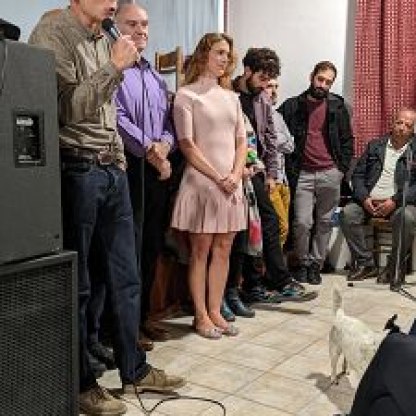
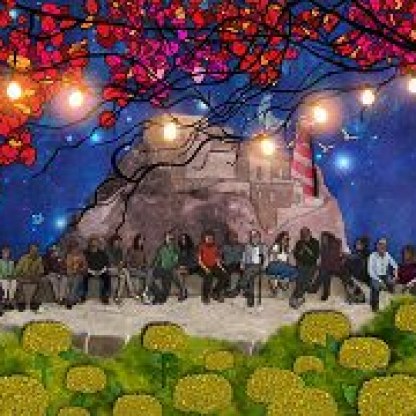
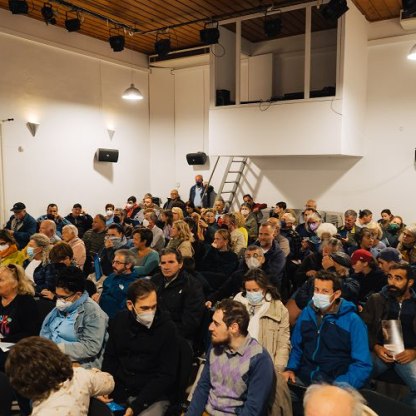
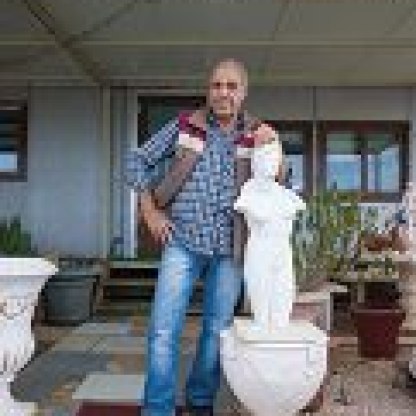
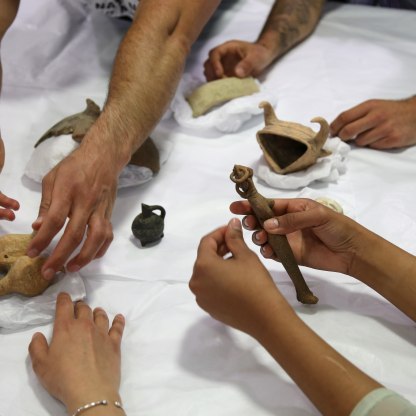
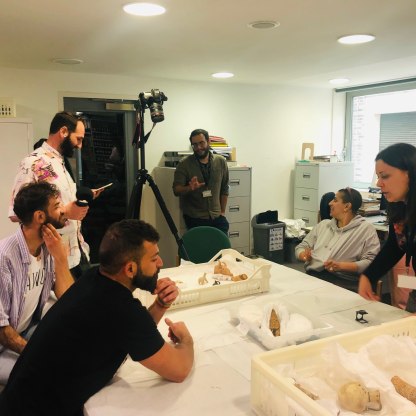
The project team continues to host specialised tours and events catering for our dedicated community partners in Cambridge and beyond. A highlight of the past season was the visit of the NEPOMAK network (United Kingdom (nepomak.org) bringing together young Cypriots from across the UK to promote and celebrate Cypriot culture and heritage, which took place on 11 September 2021 at the Fitzwilliam. Dr Marios Psaras, the Cultural Councillor of the Cyprus High Commission, was accompanied by 30 members of the network. The visitors were offered a guided tour of the Antiquities Collections, which led to an inspiring discussion on ways to increase the participation of Greek and Cypriot diaspora communities through museum practice and audience participation.
The key themes of Being an Islander - including mobility and immigration - present the opportunity for the Fitzwilliam to engage with more diverse audiences, particularly those who may not have visited the Museum before, including immigrants and refugees, who are often amongst some of the most marginalised members of our society. Given the connectivity between the project’s themes and these communities, we are aiming to develop new engagement activities, in collaboration with umbrella organisations and where possible, to integrate their voices into the exhibition in 2023.
This strand will be central to our work during 2022. In preparation, we have started our collaboration with community groups, charities and organisations within the UK that are dedicated to supporting migrants, refugees as well as recently resettled people in the United Kingdom. We have developed partnerships with the Cambridge Refugee Resettlement Campaign (CRRC), a charity organisation which is part of the Citizens UK national campaign, that aims to help resettle refugees across the UK, and with the Cambridge Convoy Refugee Action Group (CAMCRAG), which supports refugees in Europe by sending volunteer convoys and raising awareness and funds. With both organisations, we delivered virtual meetings and panel talks, and have made preliminary arrangements to extend our collaboration in 2022.
A highlight of our programming around the theme of migration and refugees was a performance jointly organised by the Fitzwilliam Museum, Kettles Yard Museum, and the Heong Gallery, on 15 March 2021, by artist Issam Kourbaj. The sound and drawing performance titled ‘Imploded, burnt, turned to ash’ marked the tenth anniversary of the Syrian uprising. The performance begun with Kourbaj drawing fragments of Arabic words and eye idols on a large surface in layers, repeating and obscuring them. The words are inspired by the teenage graffiti that sparked the Syrian uprising in March 2011, and the eye idols are based on the three Syrian eye idols from the Fitzwilliam Museum’s own collection. The performance was livestreamed and a recording of it exists here. Issam’s display of 366 eye idols, titled: ‘Don’t Wash Your Hands: neither light agrees to enter the eyes nor air the lungs’ (A. G. Leventis Gallery of Ancient Cyprus, Fitzwilliam Museum, October 2020- September 2021), created from Aleppo Soap and inspired from the Fitzwilliam’s Tell Brak eye figurines, also received very positive reviews despite the reduced accessibility brought by the winter lockdown. An example in the press in the display’s review on the Economist’s Prospero magazine by Veronique Mistiaen
On 17 June 2021 we organised a special panel talk titled: ‘Refugees in Museums’ an event also part of the programming of Refugee Week events nationally: Online talk - Refugees in Museums | Refugee Week The online panel talk aimed to highlight the resonance the refugee crisis had to contemporary art and poetry, and more generally the role of Museums in responding to social phenomena such as this. Panellists included the artist Issam Kourbaj, celebrated poet Ruth Padel, representatives of the Cambridge refugee support groups CamCRAG and CRRC) and Fitzwilliam Museum curators and learning and engagement specialists, Anastasia Christophilopoulou, Richard Kelleher and Miranda Stearn.
In 2021 we also launched our targeted programming strands centred around the Museum’s focus on health and wellbeing. Our learning specialists, Jacqui Strawbridge, Jennie Thornber and Nicola Wallis, aided by other members of the Learning and Engagement team and supported by Christophilopoulou and Stearn, delivered over ten specialised sessions for those with disabilities, focusing on groups with mental health challenges, as well as with blind and partially sighted visitors, an area of community engagement with which both learning, and Antiquities Department have years of expertise. Importantly, this work ensures that the research undertaken as part of Being an Islander will remain connected into the Museum’s ongoing business-as-usual activity even after the end of this project.
in 2021 we developed Being an Islander related content within our formal learning programme, particularly targeting primary school aged children, as part of transforming our formal learning offer in response to the COVID pandemic and creating a new offer driven by the project’s current research. As part of our new Fitz Schools virtual platform we developed through consultation with teachers, the project lead and education specialist staff in the museum collaborated to create 5 films and animation relating to our antiquities collections and Being an Islander. This included working with local primary school children to identify questions they wanted to learn about, which were then incorporated into an ‘Ask the expert’ film, as well as films centred on the Pashley sarcophagus, ancient ceramics, and ancient myths. Since their launched in September, the films have been viewed over 1,250 times, potentially representing over 30,000 children if these were whole classes.
We also created ‘Look Think Do’ starter activities for schools and families relating to Being an Islander themes, looking at objects both ancient and contemporary (using artist Issam Kourbaj’s installation) in the context of movement and migration. The new online resources are being used by schools who are unable to visit the Museum, but also to support those who have participated in our re-launched schools offer onsite. One teacher wrote:
“The videos were really helpful to show children, especially those that are a bit anxious about new things and because it has been a long time since they have been able to attend school visits. It gave them a taster of what to expect. I was amazed by how much they took in and as we were moving around the museum they kept spotting artefacts that they had seen on the video.” Another wrote: “The pottery painting video was great! The children have produced some beautiful pieces of art as a result.”
Alongside developing virtual learning resources, the Museum’s Learning Department worked with the Being an Islander project on a refreshed onsite school workshop to introduce pupils to ancient Greece. Following suspension due to COVID, the new sessions launched in October 2021, and in the first 2 months of delivery reached 284 KS2 children (and 32 teachers). This was across 11 sessions and 8 schools. Teachers have responded positively. All survey respondents strongly agree that ‘the delivery of the session I attended was appropriate for my pupils’ learning needs; allowed time to share their ideas; encouraged pupils to look closely at museum objects or paintings and to form their own interpretation; The content of the session I attended sufficiently addressed the objectives for the visit.’ Teachers wrote in the survey:
“The children loved it and it was so enriching for their learning!”
“I thought the session was well prepared and impressively displayed…. It was a wonderful experience for the learners and we will be back, for sure!”
“The session with the museum staff was great. They were fantastic with the children… looking in depth at the pots and the other items that we did was equally beneficial and most of it picked up work that we had done in the classroom and allowed children to see real artefacts and make the links to their prior learning. We had a great day and the children all really enjoyed their visit. I had a few messages from parents on Friday evening to say how much the children had enjoyed it and that they were still buzzing about it when they got home. Thank you for a wonderful day out.”
Another key area of our education delivery for 2021 was the creation of high-quality replicas of key objects from our Cyprus and Crete ancient collections, which made for the starting point of delivery of outreach sessions in the school context of the community. The replicas, paired with the already developed strands of the project’s research, such as the themes of insularity and mobility, have also supported our health and wellbeing, initiative as part of this project, as well as across the Museum. An important example is the delivery of outreach sessions employing those replicas and their accompanying narratives to long -term patients at Addenbrookes University Hospitals, children, and adults’ wards.
Being an Islander has also provided the starting point for activities for our targeted family offer, including school holiday programming. For our family audiences, we have focused on several themes within the ancient world, including ancient island architecture and its links to local resources and ways of life; everyday life and domesticity; mobility and characteristics of island life as opposed to the mainland; food and insular diets; distinctive art forms and crafts originating from the islands and many more. Several children’s workshops explored ideas around Mediterranean migration through myths and stories, as well as material culture.
The interactive and virtual reality elements of the project that are being developed now, will offer new ways for our diverse audiences to engage with the project’s research questions so resonant with our contemporary world. In 2022 and 2023 we will expand these sessions with young people, helping to refine the narrative and approach for both exhibition and public outreach programmes.
Handling sessions for general and research audiences in the Fitzwilliam Museum with material from the Cypriot and Aegean Collections
Touch tours of the Cypriot and Aegean World Antiquities of the Fitzwilliam Museum for blind and partially sighted audiences, as well as groups of people with other physical or mental disabilities and their carers.
Nora at The Fitz: a literary evening with award-winning Cypriot author Nora Nadjarian, introduced by Ingrid Jendrzejewski and narrated by the curators, researchers, and staff of the Fitzwilliam Museum. This event took place under the auspices of HE the High Commissioner of Cyprus in the UK, Mr Andreas S. Kakouris at the A. G. Leventis Gallery of Ancient Cyprus, Fitzwilliam Museum, January 30, 2020 (60 participants).
A series of workshops (entitled Make Your Own Boat), narrations, and activities on the theme of ancient migration around the Mediterranean, organised by the Learning Team and researchers of the Fitzwilliam Museum for the Cambridge Festival of Ideas, October 22, 2019 (40 participants)
Object pottery and metalware handling session by the project’s curator and conservators for the Alumni Festival on September 27, 2019 (40 participants).
Professor Paul Cartledge and Dr Anastasia Christophilopoulou narrated the history of the city of Salamis, Cyprus and of the antiquities from the region now housed in the Fitzwilliam Museum in this video


